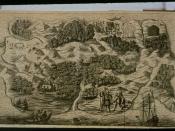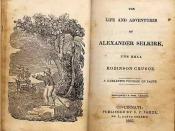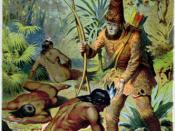The story of Robinson Crusoe although a fictional tale is rooted through the experiences of Alexander Selkirk and various other contributors and is firmly combined with some of his own experiences. It would have been related to by the people of the time as the story deals with their current issues and in this confusing era the struggle for security in an apparently irrational world may well have been paramount in a major part of people's minds. Through out Defoe's formative years and beyond that time major life changes, political upheaval and his religious background shaped and moulded him by way of being a traveller, craftsman, dissenter and even as a revolutionary. I will show in this essay how Robinson Crusoe recalls and represents his younger self to the imagined reader by relying on Defoe's vision of his past self.
According to the chronology in Robinson Crusoe (pp.vii-viii) Defoe was born in London in 1660 to James and Alice Foe.
In 1662 the Act of Uniformity forced the Foe's out of the Church of England to become Presbyterian dissenters sometimes known as puritans. His formative years encompassed the plague in 1665, the fire of London in 1666 and the abdication in 1688 of James II in favour of William of Orange who became William III. Defoe was involved with the doomed attempt of the Duke of Monmouth to take the throne from James II but other events equally as important as these public happenings helped give the basic roots for the story Robinson Crusoe. In looking at a few of these events one can see similarities between the life of Defoe and that of Crusoe.
Defoe started travelling at a young age and even camped out in a hut in Surrey to help recover Sir Adam Brown's fish after...


